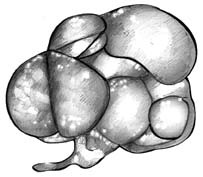Multicystic Dysplastic Kidney (MCDK)
Multicystic dysplastic kidney (MCDK) is the abnormal development of a kidney while in utero. Multiple cysts (sac-like structures) form in place of the healthy kidney and are said to resemble a “bunch of grapes.” The affected kidney has no function. About 50% of patients with MCDK have other urologic conditions affecting the other kidney (e.g., obstruction or reflux). MCDK more commonly occurs on the left side.
What Are the Symptoms and/or Complications of MCDK? 
Most children with MCDK have no symptoms. If a child does have symptoms, they might include:
- Enlarged kidney
- High blood pressure (rare and resolved after nephrectomy)
- Renal disease and renal failure (only if the opposite side has urinary problems)
How is MCDK diagnosed?
With the current use of prenatal ultrasound, MCDK is most often found before birth. Less often, the MCDK is found as an abdominal mass during a physical exam.
With the diagnosis of MCDK, other possible causes of the abnormal kidney must be ruled out with other tests. Your physician will discuss the possibility of further testing with you.
What Is the Treatment for MCDK?
The affected kidney may need no treatment. If the child has one healthy kidney and no symptoms, the child will be monitored periodically with a renal ultrasound until the cystic kidney regresses or becomes undetectable with ultrasound. Removal of the cystic kidney may be considered if it causes pain or high blood pressure, shows abnormal and atypical changes on ultrasound, is quite large, or does not regress after a period of observation.
Often, the healthy kidney is screened for defects, such as a blockage or reflux. If something is wrong, this allows the physician time to intervene quickly to save the functioning kidney before it worsens.
What to Expect for the Future?
Most children with MCDK and one normal-functioning kidney lead normal, healthy lives. The affected kidney frequently shrinks as the child matures and may be undetectable by imaging studies by the age of five. The important thing is to maintain function in the remaining kidney.
Children and adults with only one working kidney should have regular checkups for high blood pressure and evaluate kidney function.
